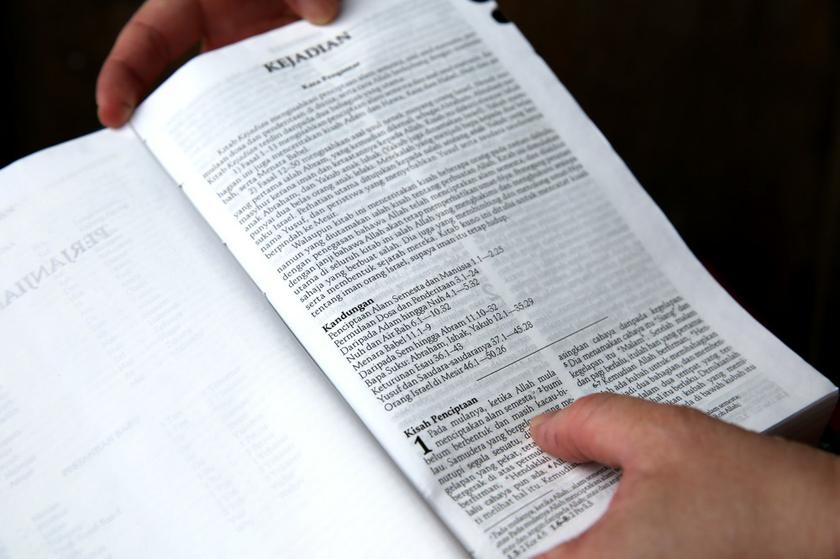KUALA LUMPUR, Oct 28 — The use of the word “Allah” by Christians to refer to their god does not cause Muslims to leave their faith, Muslim missionary Shah Kirit Kakulal Govindji has said amid fears of alleged proselytisation efforts by Christians.
Instead, Christians were more likelier to be converted to Islam after reading the Al-kitab, the Malay language Bible that contains the word “Allah”, claimed the chief preacher of the non-profit Islamic Information and Services Foundation (IIS).
Asked to comment on the widespread use of the word “Allah” by non-Christians in Muslim-majority Indonesia, Shah Kirit said that Malaysia did not necessarily have to follow Indonesia’s lead, noting that both countries have different customs.
He also said that Sabah and Sarawak had a different “uruf” (culture and customs) as compared to the Peninsular Malaysia, observing that those in the two Borneo states have been using the word “Allah” for decades.
“Even though Christians in Sabah and Sarawak have been using the word ‘Allah’ for decades, I have not met Muslims that read the Bible with the word ‘Allah’ in it, convert to Christianity. What I have seen a lot, Christians read the BM Bible with the word “Allah” and converted into Islam,” the former Hindu said in an interview with Sinar Harian that was published today.
Later in the interview, Shah Kirit said that Muslims who leave the faith do so largely because they lacked understanding of Islam, stressing that it was not due to the Christians’ use of the word “Allah” in their Al-kitab.
“The main factor they come out from Islam is (they) do not understand the Islam faith. Of those who committed apostasy, there is not one that I’ve found where he was influenced by the Christians’ use of the word ‘Allah and he converted into Christianity,” said the man who converted into Islam in 1996.
Earlier in the interview, Shah Kirit explored the possible implications of the Christians’ use of the word “Allah”, noting the fear of Muslims that they will be influenced by Christian teachings.
“But, today if Christians use the word ‘Allah’, there will be a threat and Muslims may be confused because they lack understanding of the Islam faith. Is it the fault of Christians and Jews if Muslims lack understanding of the Islam faith? That is the Muslims’ own weakness although we have religious classes in schools and various Muslim activities in Malaysia such as in radio, television, and newspapers.
He then concluded that the Christians’ use of the Arabic word would present an opportunity for Muslims to preach to the non-Muslims.
“The conclusion is, if Christians use the word “Allah”, it will be a substantial preaching material for the Muslims. However, in the context of Muslims today in Malaysia, I see that many Muslim organisations lack interest in preachig to non-Muslims and lack interest in taking this advantage to preach to non-Muslims. We are demanded to spread the message of Islam.
Shah Kirit also indicated that a ban on non-Muslims from using the word “Allah” in their religious practices would carry other implications.
“If we ban the non-Muslims from using the word “Allah”, there are many other implications that we need to see. Are we going to ban the Sikhs and Hindus from reading their own holy books?” he asked, having pointed out that the Hindus’ holy book “Veda” and the Sikh holy book uses the word “Allah”.
In the same interview, Shah Kirit said that he would engage in dialogue with non-Muslims who had used the word “Allah” in an incorrect manner.
Shah Kirit’s comments come as a debate on the right of non-Muslims, especially the Christian community, to use the word “Allah” in their religious practice continues to rage on after a recent court ruling.
Earlier this month, the Court of Appeal ruled that the Home Ministry’s decision to ban the use of the word in the Herald was justified, as the use of the word “Allah” was not integral to the practice of the Christian faith.
The ruling — which overturned an earlier High Court decision that the ban was unconstitutional — has since sparked confusion over the use of the word by Christians in their worship, especially with conflicting opinions within the government itself on how far the ruling would affect practising Christians.
Churches in Sabah and Sarawak, however, have said that they will continue their age-old practice of referring to God as “Allah” in their worship and in their holy scriptures.
Several ministers also said recently that the 10-point solution issued by Putrajaya in 2011 — which allows the printing, importation and distribution of the Al-Kitab, the Bahasa Malaysia version of the Christian bible, containing the word “Allah” — should stand, despite the appellate court ruling.
The Najib administration issued the 10-point solution shortly before the Sarawak state election in 2011 to end a Home Ministry blockade of shipments of Christian holy scriptures in the Malay language containing the word “Allah”.
The Cabinet, through Minister Datuk Seri Idris Jala, had stated in the resolution that the large Bumiputera Christian population in Sabah and Sarawak could use their holy books in the Malay, Indonesian, and indigenous languages.
Prime Minister Datuk Seri Najib Razak also said previously that the ruling would not affect Sabah and Sarawak, while separately another Cabinet minister claimed that Christians from the Borneo states could also use the word in peninsula Malaysia.
According to a 2010 census, Muslims are Malaysia’s largest religious group, followed by Buddhists. Christians are the third largest at 2.6 million, which comes up to about 10 per cent of the entire Malaysian population.
Bumiputera Christians, who form about 64 per cent or close to two-thirds of the Christian community in Malaysia, have used the word “Allah” when praying and speaking in the national language and their native tongues for centuries.



















